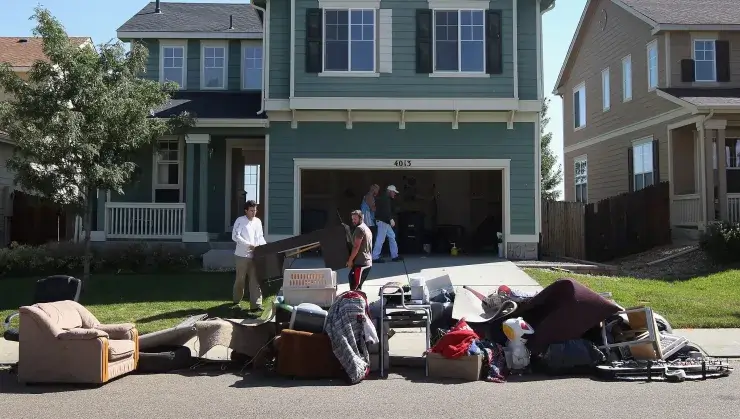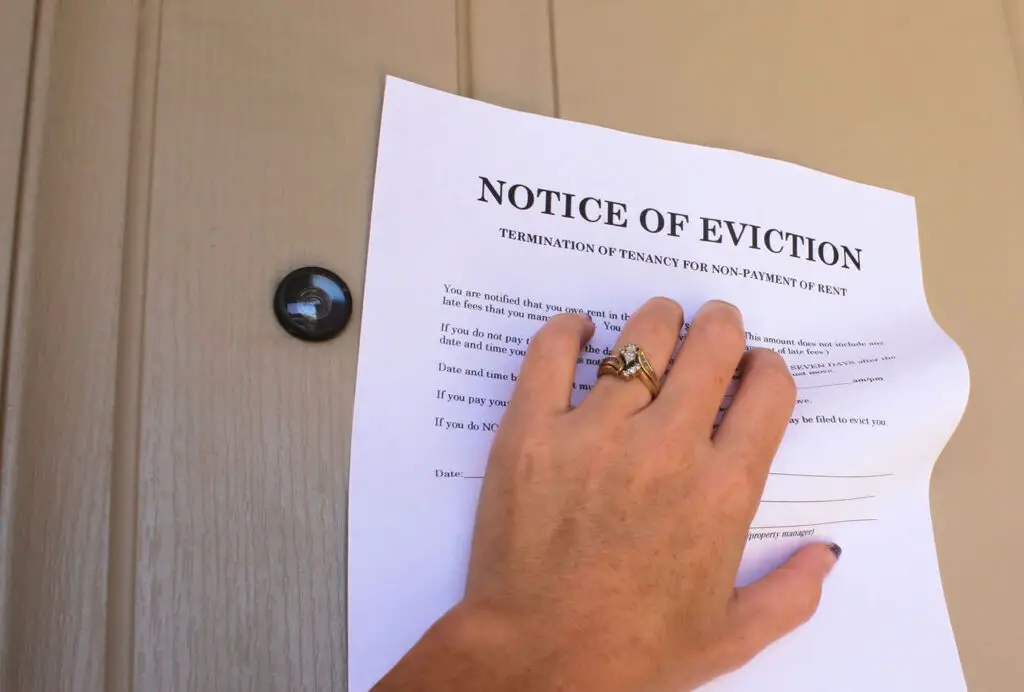Last Updated on August 6, 2023 By Emma W. Thomas
Yes, you can evict your tenant for not paying rent. However, evicting a tenant for non-payment of rent requires following the legal eviction process in your area. Consult local laws, issue a formal notice, and if necessary, go through the appropriate legal channels to regain possession of your property.
Can I Kick A Tenant Who Is Not Paying Rent Out Of My House?
Being a landlord comes with its fair share of challenges, especially when it comes to non-paying tenants. If you find yourself in a situation where your tenant is not paying rent, it’s natural to wonder what actions you can take. In this listicle, we will explore the options available to landlords when dealing with non-paying tenants.
1. Review the Lease Agreement:
The first step is to review the lease agreement you have with the tenant. Check for any clauses pertaining to non-payment of rent, late fees, or any other provisions related to eviction. Understanding the terms outlined in the lease will provide you with the necessary insights.
2. Communicate with the Tenant:
Open lines of communication are vital in such situations. Reach out to the tenant and discuss the issue of non-payment. It’s possible that there may be extenuating circumstances that have hindered their ability to pay. Give them an opportunity to explain their situation and express your concerns.
3. Serve an Eviction Notice:
If the tenant fails to address their non-payment, you may have to serve an eviction notice. The process and timeframe for eviction may vary depending on your local laws and regulations. It’s essential to follow the proper legal procedures for serving notices to protect your rights as a landlord.
4. Seek Legal Advice:
Navigating the legal aspects of evictions can be complex. Consult with a lawyer who specializes in landlord-tenant matters. They can provide you with the necessary guidance and ensure you are following the correct legal procedures while protecting your rights.
5. Consider Mediation or Arbitration:
In some cases, mediation or arbitration can be a viable alternative to avoid legal proceedings. This approach involves bringing in a neutral third party to help facilitate a resolution between you and the tenant. It may result in a compromise or payment plan that satisfies both parties without going to court.
6. File a Lawsuit for Unpaid Rent:
If all else fails, filing a lawsuit may be your last resort to recover unpaid rent. Consult with your lawyer to determine whether pursuing legal action is the right course of action and what steps need to be taken.
7. Understand Tenant Rights:
It is crucial to be aware of tenant rights in your locality. Laws regarding evictions and non-payment of rent can differ from state to state or country to country. Familiarize yourself with the legal requirements and restrictions to ensure you are operating within the confines of the law.
8. Avoid Self-Help Eviction:
While it may be tempting to take matters into your own hands, exercising what is known as “self-help eviction” is not advisable. This includes changing locks, shutting off utilities, or removing the tenant’s belongings without following legal procedures. Engaging in self-help eviction can lead to legal repercussions and potential lawsuits against you.
Dealing with non-paying tenants is undoubtedly challenging, but it’s important to follow the proper legal procedures to protect your rights as a landlord. By understanding your lease agreement, communicating with the tenant, seeking legal advice, and following the necessary eviction processes, you can navigate the situation effectively. Remember to prioritize communication and explore alternative resolutions before resorting to legal action.
What To Do If A Tenant Stops Paying Rent

Has your tenant stopped paying rent, and you are confused about what to do as a landlord? You can employ the following tactics to deal with your tenants:
Discussing With Your Tenant
When your tenant stops paying rent or pays late, the first thing to do is talk to them and know where the problem is. While it is good to be understanding, your tenants need to pay their bills on time, or they cannot stay. Your tenant needs to know that you also have obligations to meet. Let them realize that you understand their hardship and that you can allow them out of their lease with no penalty.
You can inform your tenant that they will get a formal eviction notice if they can’t move out independently. Your tenant may start paying rent on time after talking to them since they know that moving out will come with additional costs. The hustle of looking for another place, paying moving costs, rent, and security deposits in a new home may make them reconsider their commitment.
Give Your Tenant A ‘Pay’ Or ‘Quit’ Notice.
It is a requirement in almost every state for a landlord to issue a pay or quit notice to a tenant who does not meet his/her obligation to pay rent on time. This notice is usually a formal email or letter reminding them of their late payment. The message states the number of days they have to honor their obligation; otherwise, their lease will be terminated.
In most states, the notice ranges from three to five days. If the tenants fail to pay and also move out, they formally lose their right to occupy your premises. You can then file an action with your local court to have them evicted.
File An Eviction Order
A landlord cannot kick a tenant out of their property unless they have a sheriff’s assistance. You can also not cut off essential utilities. If, as a landlord, you have a tenant that is not paying rent, you may need to go to your local court and do the proper filing for an eviction hearing. Ensure that you carry a copy of the notice to ‘pay’ or ‘quit’ as they may need to see it.
The administrator will list your hearing once you pay court fees, and this may be within 2 – 6 weeks. Some courts may serve your tenant the subpoena, but in some cases, you will be responsible. If, after explaining your case, you win a judgment, then you can get an authorized person to kick out the tenant.
Engage A Lawyer Or A Property Manager
You may, at times, be unable to deal with your tenant in enforcing timely rent payments. In such a case, it is best to hire a property manager to act on your behalf. A professional property manager will be in a position to ensure that rogue tenants pay their rent on time. Property management companies have systems in place that allow them to handle uncooperative tenants.
You could also hire a lawyer to serve the tenant with formal letters and notice and hence help recover your money.
Paying Your Tenant To Move Out
Your tenant may still not be in a position to leave your house even after you have talked with them. You can decide to avoid the evection process by entering into a deal with them. If your tenant is experiencing financial problems and cannot pay rent, you can motivate them to leave by paying them. While this idea may sound absurd since they owe you, it might work well and save you the trouble of eviction costs.
You will have to consider the options of delayed evections together with the cost involved. An eviction process may take between one and three months, which will still be costly for you as the landlord. Paying your tenant to move out will save you a great deal, and you may even get another one immediately. It will also free you of the stress you are likely to experience as you wait for the process of kicking them out to end.
Steps For evicting a tenant
Sometimes it becomes inevitable to evict your tenant who is not paying rent regardless of your relationship with them. However, before you can undertake the eviction process, it is necessary to understand the rules and procedures. The following steps are crucial:
Knowing The Eviction Laws Of Your State
Every state has its eviction laws, and it is always advisable to understand them before signing a lease agreement. You can engage your lawyer to write the deal using legal forms. In case you had not signed a lease agreement, try to find out more about your current situation and if you can win the eviction case. Familiarize yourself with URLTA (Uniform Residential Landlord and Tenant Act) to get more details on the legal eviction process.
Avoid taking matters into your hands since self-help evictions are not legal.
Have A Genuine Reason For Eviction
Before you embark on the process of evicting your tenant, ensure that you have a lawful and valid reason. The following reasons will justify your need to kick out your tenant from your premises;
- Failure to pay rent or continuous late payment
- Violation of the lease agreement such as subletting, keeping pets, and using the premises illegally
- Damage to the property
- A tenant causing safety or health hazards
- Breaking of health, occupancy, or health ordinances
- If you have documented evidence that your tenant is guilty of the above offenses, then you are justified to evict them.
Giving A Formal Notice To Evict
If you find out that you have enough valid reasons to evict your uncooperative tenant, then ensure that you follow the laid down legal procedures. You will need to give adequate notice of eviction. The notice is a simple form or letter informing your tenant of the reasons for removal. It should also tell them what to do to avoid being evicted, such as repairing the house and paying their dues.
Your eviction notice should include the following:
- A deadline to pay or move out
- The total amount owed to you by the tenant
- Post the notice within a certain number of days before you can file the eviction with your local court
- Tape the document on the tenant’s door and also send it through a certified mail address
- Use an eviction form template that is specific for your state.
Filing For Eviction With Your Local Court
The next step after serving your tenant with an eviction notice is to go to your local courthouse. Pay the required fee so that the clerk schedules a hearing and summons the tenant. You may be required to show that you gave enough time for an eviction notice.
Attending The Court Hearing
When attending the court hearing, ensure that you have all the necessary documents and proof of your claim. Make sure also that you have the following among others:
- Bounced checks
- Lease agreements
- Any communication records between your tenant and you
- Lease agreements
- A record of any payment
- A copy of the eviction notice
Evidence that your tenant received the notice. This proof could be in the form of a post office receipt or the tenant’s signature.
Evicting The Tenant

If the court approves the eviction process, your tenant will be given a deadline to leave. They will be allowed between 48 hours and one week, depending on your state. If the tenant does not move out after the expiry of the deadline, you can hire a sheriff to enforce the eviction order.
References:
https://www.cia-landlords.co.uk/advice/can-i-evict-my-tenant-for-not-paying-rent/
https://rentprep.com/blog/evictions/how-to-get-rid-of-tenants-without-eviction/
Emma is a graduate of Domestic Science or Family and Consumer Sciences (Home Economics) from the University of Wisconsin. She has 7 years of experience Working with the strategic section of BestBuy and now writing full-time for Homeeon.
From Managing the Home, Interiors, Cleaning, and Exteriors to Gardening and everything about Making A Home Liveable – is her passion and this Homeeon is the result of this.
Emma loves decorating her home with the best stuff found online. She cares about quality over anything and writes reviews about them here in Homeeon. Get in touch with her over Pinterest.
Keep reading her blogs.

